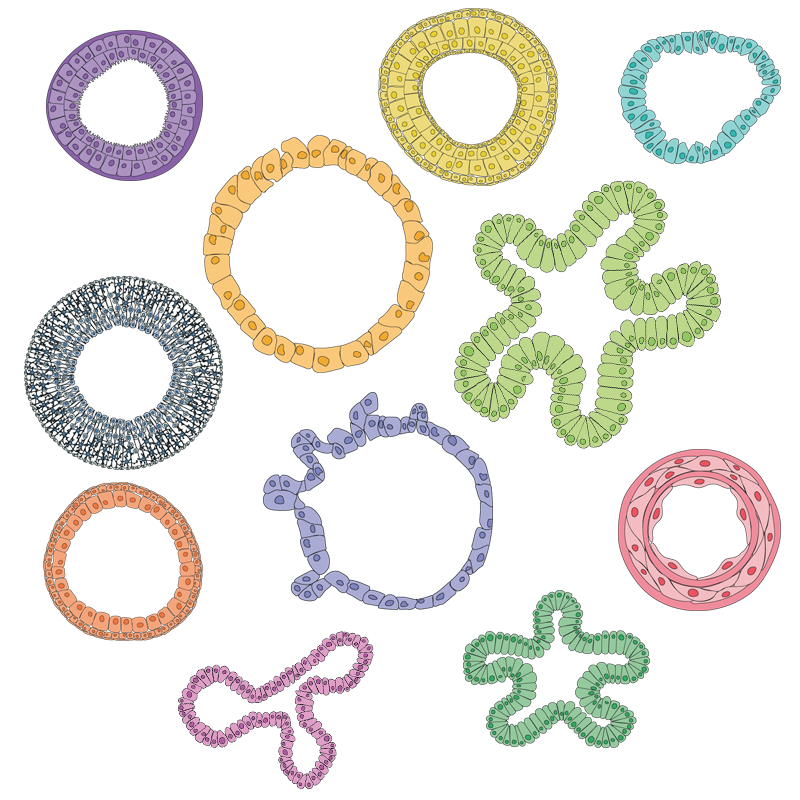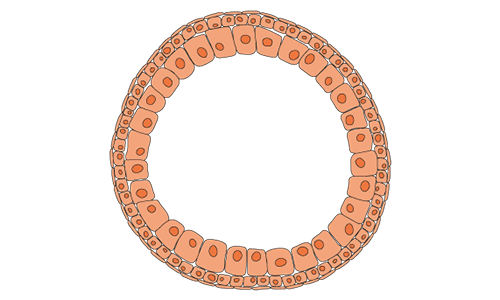Growth factors and cytokines for organoid research
Qkine is committed to manufacturing enhanced-quality bioactive proteins to improve scientific outcomes and reproducibility. We provide a complete portfolio of animal origin-free and carrier protein-free growth factors and cytokines for organoid culture.
Organoids are 3D assemblies of cells, containing multiple cell types, arranged in a similar structure to the modeled tissue, but on a micro-scale. Organoids can represent a more physiologically relevant model of tissues than 2D and mono-culture systems.
As organoids recapitulate tissue-specific features, they are used in the study of tissue development and maintenance, stem cell characteristics, cellular interactions, precision medicine, disease modelling and drug discovery. Due to long periods in culture, it is important that all growth factors for organoid culture give highly consistent biological activity.
Where possible, consider replacing conditioned media with recombinant proteins such as high purity R-spondin 1 and noggin to improve reproducibility and scale-up.

Growth factors for organoid culture media

Intestinal organoids
Recombinant human EGF protein (Qk011) Recombinant human FGF-2 (145 aa) protein (Qk025) Recombinant human FGF-2 (154 aa) protein (Qk027) Recombinant human IGF-1 protein (Qk047) Recombinant human noggin protein (Qk034) Recombinant mouse noggin protein (Qk033) Recombinant human R-spondin 1 protein (Qk006)
Breast organoids
Recombinant human EGF protein (Qk011) Recombinant human KGF (FGF-7) protein (Qk046) Recombinant human FGF-10 protein (Qk003) Recombinant human HGF NK1 protein (Qk013) Recombinant human noggin protein (Qk034) Recombinant mouse noggin protein (Qk033) Recombinant human NRG-1 protein (Qk045) Recombinant human R-spondin 1 protein (Qk006)
Liver organoids
Recombinant human activin A protein (Qk001) Recombinant human BMP-4 protein (Qk038) Recombinant human EGF protein (Qk011) Recombinant human FGF-2 (145 aa) protein (Qk025) Recombinant human FGF-2 (154 aa) protein (Qk027) Recombinant human KGF (FGF-7) protein (Qk046) Recombinant human HGF NK1 protein (Qk013) Recombinant human OSM protein (Qk049)Product focus
Recombinant R-spondin 1 protein can replace R-spondin 1 from conditioned media in pancreatic tumor organoid culture.
Comparison between human healthy pancreatic organoids and human PDAC tumor organoids in three culture conditions over three passages.
P-0 indicates the initial start of the culture in full growth media supplemented with R-spondin 1 conditioned media (A). Comparison of pancreatic organoid growth after three passages (P-3) in media supplemented with R-spondin 1 conditioned media (B), recombinant R-spondin 1 (Qk006) (C), or no R-spondin 1 (D).
No differences in organoid growth have been observed when using recombinant R-spondin-1 instead of R-spondin-1-conditioned media.
Experiments have been conducted by Dennis Plenker, Ph.D. in the lab of Dr David Tuveson at Cold Spring Harbor Laboratory.

Trouble-shooting organoid culture, some inspiration!
Can you use engineered or niche-specific growth factors to improve your organoid culture?
Super Scientist flies in with easy fixes and questions to ask yourself – do you need to replace the conditioned media, explore new growth factor combinations, switch noggin and gremlin, or be bold and explore new engineered proteins.
Animal origin-free growth factors for organoids
Our science team is here to help, please contact us if you have any questions.





